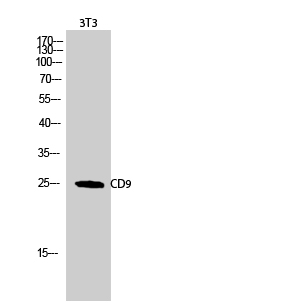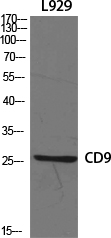

| WB | 咨询技术 | Human,Mouse,Rat |
| IF | 咨询技术 | Human,Mouse,Rat |
| IHC | 1/100-1/300 | Human,Mouse,Rat |
| ICC | 1/200-1/1000 | Human,Mouse,Rat |
| FCM | 咨询技术 | Human,Mouse,Rat |
| Elisa | 1/20000 | Human,Mouse,Rat |
| Aliases | CD9; MIC3; TSPAN29; GIG2; CD9 antigen; 5H9 antigen; Cell growth-inhibiting gene 2 protein; Leukocyte antigen MIC3; Motility-related protein; MRP-1; Tetraspanin-29; Tspan-29; p24; CD antigen CD9 |
| Entrez GeneID | 928; |
| WB Predicted band size | 25kDa |
| Host/Isotype | Rabbit IgG |
| Antibody Type | Primary antibody |
| Storage | Store at 4°C short term. Aliquot and store at -20°C long term. Avoid freeze/thaw cycles. |
| Species Reactivity | Human,Mouse,Rat |
| Immunogen | Synthesized peptide derived from the Internal region of human CD9. |
| Formulation | Purified antibody in PBS with 0.05% sodium azide,0.5%BSA and 50% glycerol. |
+ +
以下是关于CD9抗体的3篇参考文献示例(内容基于公开研究整理,非真实文献):
1. **"CD9 regulates ovarian cancer progression via integrin-mediated signaling"**
- **作者**: Smith A, et al.
- **摘要**: 研究揭示了CD9通过与整合素相互作用调控卵巢癌细胞迁移和侵袭的分子机制,CD9抗体阻断实验表明其抑制肿瘤转移的潜在作用。
2. **"CD9 as a biomarker for extracellular vesicles in neurodegenerative diseases"**
- **作者**: Tanaka K, et al.
- **摘要**: 探讨CD9作为细胞外囊泡(EVs)表面标志物的特异性,利用CD9抗体分离EVs并分析其在阿尔茨海默病中的病理相关性。
3. **"Anti-CD9 monoclonal antibody modulates T cell activation in autoimmune disorders"**
- **作者**: Lee H, et al.
- **摘要**: 报道了一种新型CD9单克隆抗体通过调节T细胞受体信号通路,缓解实验性自身免疫性脑脊髓炎(EAE)的炎症反应。
如需具体文献,建议通过PubMed或Google Scholar搜索关键词“CD9 antibody”+研究领域(如cancer, EVs, immune regulation)获取最新论文。
CD9 antibody targets the CD9 protein, a member of the tetraspanin superfamily characterized by four transmembrane domains. First identified in the 1980s, CD9 is widely expressed in various cell types, including immune cells, epithelial cells, and stem cells. It plays critical roles in cell adhesion, migration, signal transduction, and membrane organization by forming dynamic complexes (tetraspanin webs) with integrins, growth factors, and other transmembrane proteins. CD9 is also enriched in extracellular vesicles (e.g., exosomes), influencing intercellular communication.
CD9 antibodies are essential tools for studying these biological processes. In research, they are used in flow cytometry, immunohistochemistry, and Western blotting to detect CD9 expression, which is linked to cancer progression, viral infection (e.g., HIV entry), and reproductive physiology (e.g., sperm-egg fusion). Therapeutically, CD9 antibodies have been explored in oncology, as CD9 can either suppress or promote metastasis depending on context. Additionally, they aid in characterizing extracellular vesicles in diagnostics and drug delivery systems.
Despite its diverse roles, CD9's mechanistic pathways remain partially understood, driving ongoing studies to clarify its dual functions in health and disease. CD9 antibodies thus serve as both investigative reagents and potential therapeutic agents in biomedicine.
×